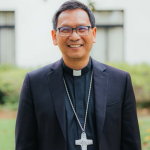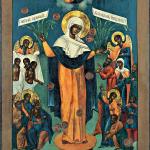Last updated on: March 21, 2015 at 11:10 am
By
CNA Daily News
Rome, Italy, Mar 21, 2015 / 05:10 am (CNA/EWTN News).- Pope Francis told the people of Naples – a city ravaged by crime and mafia violence – that change is possible, and encouraged those involved in organized crime to convert and work toward a better future. “It's time for Naples surrender: this is my wish and my prayer for a city that has so much spiritual, cultural and human potential, and above all so much capacity to love,” the Pope told those present at his March 21 Mass. The future of Naples “is not resigned to fold in on itself, but to open to the world with confidence,” he said, adding that “to hope is already to resist evil…to hope is to wager on the mercy of God, who is Father and always forgives and forgives everything.” Pope Francis' Mass, held in Naples’ Piazza Plebiscito, took place during his March 21 day trip to the city and neighboring Pompeii. After paying a brief visit to Pompeii’s shrine housing a miraculous image of Our Lady of the Rosary, Pope Francis took a helicopter to Naples, where he met with people from various social classes and spoke harsh words against corruption, saying that “a corrupt society stinks like a rotting corpse!” In his homily during Mass, Francis pointed out how the guards sent by the chief priests to arrest Jesus in the Gospel came back dumbfounded and empty-handed, saying that “No man has ever spoken like this!” Jesus’ words are powerful, he said, but can sometimes cause an interior conflict because although we hear their “the charm, beauty and truth,” we reject them because “they make us question ourselves and is costs us too much to observe them.” However, it is only Jesus and his words of mercy that can heal the wounds inflicted on hearts and society. When hearts open to the Gospel, he noted, that is when “the world begins to change and humanity rises again! If we welcome and we live the Word of Jesus every day, we are resurrected with him.” Francis spoke of Lent as a time to allow oneself to be open to this change as the Church journeys toward Easter, saying that it is a time when the hope of rising with Christ is “rekindled.” “May the grace of this Easter not arrive in vain for the people of God in this city! May the grace of the Resurrection be welcomed by each one of you, because Naples is full of hope in Christ the Lord!” he said, and called particularly on the youth to be open to “the power of the Risen Jesus.” Pope Francis told the inhabitants of Naples not to give up hope, and urged them not to give in “to the lure of quick profits or dishonest income.” He encouraged them to react with firm resistance in the face of organizations that exploit or corrupt the youth, the poor and the weak, as well as the “cynic drug trade” and other crimes plaguing the city. “Corruption and crime don't disfigure the face of this beautiful city!” the Pope affirmed, and called on all those involved in organized crime, including their accomplices, to convert back to the path of love and justice. “Let yourselves find the mercy of God! With the grace of God, which forgives all, it's possible to return to an honest life,” he said, explaining that “the tears of the mothers of Naples,” as well as those of Mary, are begging for this. Referring to Jesus’ words in the Gospel, Francis said that the Word of God is powerful, and seeks to reach everyone without exclusion, especially those on the peripheries of society. This word receives its strength not from the world, but from the Lord, he said, explaining that God’s power “is that of love: a love which doesn't know limits, a love which makes us love the other before ourselves.” “The word of Jesus, the Holy Gospel, teaches that the truly blessed are the poor in spirit, the non-violent, the meek, the workers of peace and justice. This is the strength that changes the world!” Each person and parish is called to go beyond our own “fences” and bring this message to everyone, the Pope said, so that the Church can be a sanctuary and source of hope for the poor, elderly and those in need. “Go and welcome: this is the heartbeat of the Mother Church, and of all her children,” he observed. Pope Francis closed his homily saying that God is both the source of joy and reason for our hope, and emphasized that the Lord lives among us in our cities. “God lives in Naples!” he said, and prayed that the Lord’s grace sustain the city’s inhabitants “on your journey of faith, hope and charity, your good resolutions and your plans of moral and social redemption.” Today’s condemnation of criminal activities, drug abuse and violence due to organized crime is not the first time Francis has been outspoken on the issue. Last June during a one day trip to the diocese of Cassano all’Jonio, roughly 165 miles south of Naples, the Pope spoke harsh words against the local mafia, known as the 'Ndrangheta. He called them “adorers of evil” and said that all who have chosen the “evil road, such as the mobsters, (are) not in communion with God. They are ‘excommunicated.’” Last month Francis received members of the diocese in audience at the Vatican, where he repeated his condemnation and plea of conversion for all who participate in organized crime. No one can “call themselves Christians and violate the dignity of the person; those who belong to the Christian community cannot program or carry out acts of violence against others and against the environment,” he said during the audience, and called for a public conversion of mafia criminals. Read more















